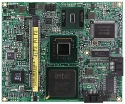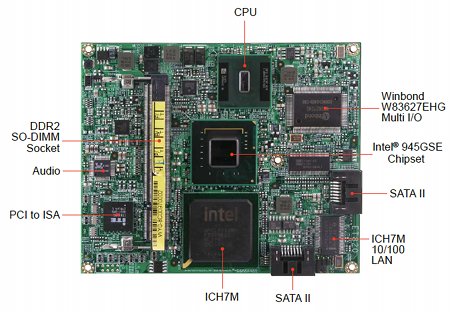ETX module sports Atom
Feb 10, 2009 — by LinuxDevices Staff — from the LinuxDevices Archive — 14 views Ibase Technology announced an ETX COM (computer-on-module) for passively cooled industrial and embedded applications, including infotainment, automation, and medical devices. The “ET820” includes a 1.6GHz Intel Atom N270 CPU, up to 2GB of DDR2 RAM, two SATA II ports, and a PCI-to-ISA bridge, says Ibase.
Ibase Technology announced an ETX COM (computer-on-module) for passively cooled industrial and embedded applications, including infotainment, automation, and medical devices. The “ET820” includes a 1.6GHz Intel Atom N270 CPU, up to 2GB of DDR2 RAM, two SATA II ports, and a PCI-to-ISA bridge, says Ibase.
(Click here for a larger view of Ibase's ET820)
Ibase's new ET820 employs the 4.5 x 3.7 inch ETX COM format, originally introduced by Jumptec and later acquired by Kontron. More specifically, the device complies with the ETX 3.0 format, which means that while it has sprouted two SATA ports, its main connectors remain compatible with any ETX carrier board. Other recently released ETX modules with Intel's Atom N270 include Adlink's ETX-AT and Kontron's ETX-DC.
ETX COMs may be especially appropriate for customers creating devices that need to include legacy ISA support. Ibase serves this constituency by fitting the ET820 with ITE's IT8888G PCI-to-ISA bridge (below left), allowing the module to offer both 16-bit ISA and 32-bit PCI expansion.

Add-on I/O and bridge chips extend the ET820's functionality
(Click to enlarge)
The device also includes another key add-on, Winbond's W8362EHG I/O chip [PDF link, here]. This IC (visible, above right) is used to add two serial ports, a parallel port, and other functionality.
The ET820's core abilities are provided by Intel chips, however, including the 1.6GHz N270 CPU, the 82945GSE northbridge, and ICH7M southbridge — all by now familiar from dozens of netbooks and other products. A SODIMM socket on the COM accepts up to 1GB of RAM, while two SATA II ports on the module itself allow for the attachment of persistent storage.
Other interfaces all pass through the device's ETX connectors. They include four USB ports, two COM ports (one RS232, one RS232/422/485), two IDE ports, a parallel port, and PS/2 keyboard/mouse ports. Of course, the ET820 also includes 10/100 Ethernet. Meanwhile, according to Ibase, there's support for dual displays, in the form of both a CRT and 18/24-bit LVDS.
Ibase notes that the N270 on its own consumes 2.5 Watts, and says the ET820 uses 12 to 15 Watts overall.
Features and specifications cited by Ibase for the ET820 include:
- Processor — Intel Atom N270 running at 1.6GHz, 512MB second-level cache
- Memory — Up to 1GB of DDR2 DRAM
- Display — LVDS flat panel or CRT output with shared video memory
- Networking — 10/100 Ethernet
- Other I/O:
- 2 x SATA
- 2 x IDE
- 2 x serial (1 x RS232, 1 x RS232/422/485)
- 4 x USB 2.0
- 1 x parallel
- Line input/output and microphone input
- 2 x PS/2 for keyboard and mouse
- 2 x SATA
- Expansion — Interface support for ISA and 32-bit 33MHz PCI
- Power — 5VDC, 12 to 15 Watts
- Dimensions — 4.5 x 3.7 inches (114 x 95mm)
- Operating temperature — 0 to 60 deg. C
Further information
Ibase did not announce pricing for the ET820 but says the device is available now. Operating system support also was not detailed; however, devices using the Intel, ITE, and Winbond components mentioned typically support Linux, Windows XP Embedded, Windows XP, Windows CE, and other operating systems.
This article was originally published on LinuxDevices.com and has been donated to the open source community by QuinStreet Inc. Please visit LinuxToday.com for up-to-date news and articles about Linux and open source.